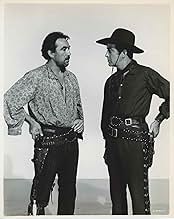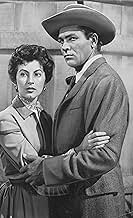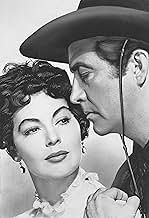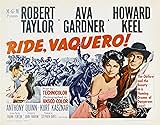CALIFICACIÓN DE IMDb
6.1/10
1.2 k
TU CALIFICACIÓN
Two outlaws, Rio and Esqueda, raised together as stepbrothers, have a showdown over the issue of whether to evict new settlers from their territory.Two outlaws, Rio and Esqueda, raised together as stepbrothers, have a showdown over the issue of whether to evict new settlers from their territory.Two outlaws, Rio and Esqueda, raised together as stepbrothers, have a showdown over the issue of whether to evict new settlers from their territory.
- Dirección
- Guionistas
- Elenco
Stanley Andrews
- Gen. Sheridan
- (sin créditos)
Arthur Berkeley
- Townsman
- (sin créditos)
Monte Blue
- Bartender
- (sin créditos)
Chet Brandenburg
- Townsman
- (sin créditos)
- Dirección
- Guionistas
- Todo el elenco y el equipo
- Producción, taquilla y más en IMDbPro
Opiniones destacadas
Maybe even better than John Wayne's HONDO, at least for my taste. And Anthony Quinn has a role, a character very close to the one he will have in LAST GUN FROM GUN HILL or WARLOCK, the hero's "best friend" against whom he will have to fight in the end. And remember the late Tony Quinn's film REVENGE, from director Tony Scott, still the same kind of character place in the story. I don't mean his characters look the same, but only I think that Quinn always plays the same kind of roles. He was not the only one though. Many actors were like him, always the same position in a scheme. And Robert Taylor is so ambivalent, ambiguous, as an Audie Murphy at his best, or Brian Keith in SIERRA BARON. He and Ava Gardner are absolutely awesome.
King Cameron (Howard Keel) takes his wife Cordelia Cameron (Ava Gardner) to their ranch home in Texas. They find it burned down and their cattle slaughtered. It is apparently Mexican bandit José Esqueda (Anthony Quinn) who hates Americans. He and his gang show up in town. He needs his tooth pulled by the local dentist. He grew up with his right-hand man Rio (Robert Taylor).
Anthony Quinn outshines everybody. I really wish that he has another guy to play with, but the other guys are not up to his level. Robert Taylor has a few moments, but he can't match Quinn. Well, this has Ava Gardner and that's something.
Anthony Quinn outshines everybody. I really wish that he has another guy to play with, but the other guys are not up to his level. Robert Taylor has a few moments, but he can't match Quinn. Well, this has Ava Gardner and that's something.
Before I saw this movie, I had not heard of the director John Farrow. After some research I found that he was the father of Mia Farrow. I also found that he had good writing skills. This is apparent after you view this film closely. The lead characters are Rio (Robert Taylor) and Esqueda (Anthony Quinn) who turn out to be each others alter ego--one man slaps a woman who kisses him and the other kisses a woman before she slaps him.
It's an unusual western because there is no hero--only a handsome troubled anti-hero. It is an unusual western in that Mexicans are not always painted as bad or stupid--it presents them as human beings. Even the 'bad' Esqueda has reverence for God's blessings. This probably is a result of Farrow's Catholicism as it is in the case when the priest gives the final blessings to the dead anti-hero (whose body is not shown, for some strange reason). An unusual way to end a film.
Evidently Farrow espoused family values--the couple's marriage is strengthened and Rio says his adopted mother would not have approved of her son Esqueda's actions. The family bonds between Rio and Esqueda are the cornerstones of the script, with doses of Catholicism and social comments thrown in. Something tells me the film we see today is not what the director intended to show--perhaps the studios had their say. The loose editing makes one wonder what was going on.
As far as performances, I think this is one of Quinn's finest unsung performances. Taylor is handsome and plays the dark anti-hero well--predictably dressed in dark colors. Ava Gardner's role is supposed to be heroic--dressed in white--but is it so simplistic to dismiss it as such. Is it a coincidence that she behaves differently when she wears pink?
It is a strange and a fascinating trio--Taylor, Quinn and Gardner. Farrow had, in my view, a great chance to make a memorable film but somehow fumbled.
It's an unusual western because there is no hero--only a handsome troubled anti-hero. It is an unusual western in that Mexicans are not always painted as bad or stupid--it presents them as human beings. Even the 'bad' Esqueda has reverence for God's blessings. This probably is a result of Farrow's Catholicism as it is in the case when the priest gives the final blessings to the dead anti-hero (whose body is not shown, for some strange reason). An unusual way to end a film.
Evidently Farrow espoused family values--the couple's marriage is strengthened and Rio says his adopted mother would not have approved of her son Esqueda's actions. The family bonds between Rio and Esqueda are the cornerstones of the script, with doses of Catholicism and social comments thrown in. Something tells me the film we see today is not what the director intended to show--perhaps the studios had their say. The loose editing makes one wonder what was going on.
As far as performances, I think this is one of Quinn's finest unsung performances. Taylor is handsome and plays the dark anti-hero well--predictably dressed in dark colors. Ava Gardner's role is supposed to be heroic--dressed in white--but is it so simplistic to dismiss it as such. Is it a coincidence that she behaves differently when she wears pink?
It is a strange and a fascinating trio--Taylor, Quinn and Gardner. Farrow had, in my view, a great chance to make a memorable film but somehow fumbled.
Ride, Vaquero! is directed by John Farrow and written by Frank Fenton. It stars Robert Taylor, Ava Gardner, Howard Keel, Anthony Quinn, Kurt Kasznar and Ted de Corsa. Music is by Bronislau Kaper and cinematography by Robert Surtees.
Out of MGM and filmed in Ansco Color at Kanab in Utah (though story is set in Texas), Ride, Vaquero! is collectively unusual, bold and frustrating. Plot revolves around outlaws lead by bandido Esqueda (Quinn) refusing to let settlers and civilisation come to the Brownsville territory. So far so formulaic, then, but Esqueda's right hand man is Rio (Taylor), who was raised by Esqueda's mother and therefore they be adopted brothers. When King Cameron (Keel) and his wife Cordelia (Gardner) refuse to be shunted out of Brownsville, with King trying to rally the townsfolk against Esqueda, Rio starts to feel sympathy for the Cameron's.
What unfolds is a sort of Freudian Greek Tragedy, a love quadrilateral as Esqueda and Rio love each other in that manly brotherly way, Cordelia begins to love Rio, love which he is keen to reciprocate, while King will always love Cordelia no mater what. Action is competently put together by Farrow as it all builds to a big finale, which doesn't disappoint on narrative terms, and the airy location photography (this is one of the better Ansco Color productions I have seen) is delightful. While naturally there will be sacrifices and psychologically tinged twists along the way to keep the faithful interested.
Quinn is wonderfully ebullient, enjoying himself with a licence to chow down on the script with relish. Taylor is subdued, sleep walking through the film under direction to be a man of quiet menace and emotional confliction. Keel looks like he is desperate to sing a song, or just be some place else, while Gardner is required to just look pretty and pretty wistful from time to time. Kasznar as Father Antonio comes out in credit, but when the screenplay has him refusing stolen money to help the church - only to then have him 15 minutes later shooting away with rifle to kill his fellow man - the inconsistency in the production is further compounded.
Keel hated the boredom of the shoot, stuck out in the wilderness with nothing to do for months he said, and Gardner hated Farrow, citing him as a sleazy bully to women and horses! These complaints do show, the film feels like it's treading water, where if you take out Quinn you are left with what comes across as a bunch of actors working for food. Characterisations are not well drawn enough to make the promise of the mind matters work, and supporting players like Jack Elam wander in and out of the picture without due care and attention.
There's good intentions in the screenplay, where for 1953 this could have been ahead of its time and setting the bar for Freudian flavoured Westerns. While it's on it engages for sure, but once finished there's the distinct feeling that it was never all that it could have been. A shame really. 6/10
Out of MGM and filmed in Ansco Color at Kanab in Utah (though story is set in Texas), Ride, Vaquero! is collectively unusual, bold and frustrating. Plot revolves around outlaws lead by bandido Esqueda (Quinn) refusing to let settlers and civilisation come to the Brownsville territory. So far so formulaic, then, but Esqueda's right hand man is Rio (Taylor), who was raised by Esqueda's mother and therefore they be adopted brothers. When King Cameron (Keel) and his wife Cordelia (Gardner) refuse to be shunted out of Brownsville, with King trying to rally the townsfolk against Esqueda, Rio starts to feel sympathy for the Cameron's.
What unfolds is a sort of Freudian Greek Tragedy, a love quadrilateral as Esqueda and Rio love each other in that manly brotherly way, Cordelia begins to love Rio, love which he is keen to reciprocate, while King will always love Cordelia no mater what. Action is competently put together by Farrow as it all builds to a big finale, which doesn't disappoint on narrative terms, and the airy location photography (this is one of the better Ansco Color productions I have seen) is delightful. While naturally there will be sacrifices and psychologically tinged twists along the way to keep the faithful interested.
Quinn is wonderfully ebullient, enjoying himself with a licence to chow down on the script with relish. Taylor is subdued, sleep walking through the film under direction to be a man of quiet menace and emotional confliction. Keel looks like he is desperate to sing a song, or just be some place else, while Gardner is required to just look pretty and pretty wistful from time to time. Kasznar as Father Antonio comes out in credit, but when the screenplay has him refusing stolen money to help the church - only to then have him 15 minutes later shooting away with rifle to kill his fellow man - the inconsistency in the production is further compounded.
Keel hated the boredom of the shoot, stuck out in the wilderness with nothing to do for months he said, and Gardner hated Farrow, citing him as a sleazy bully to women and horses! These complaints do show, the film feels like it's treading water, where if you take out Quinn you are left with what comes across as a bunch of actors working for food. Characterisations are not well drawn enough to make the promise of the mind matters work, and supporting players like Jack Elam wander in and out of the picture without due care and attention.
There's good intentions in the screenplay, where for 1953 this could have been ahead of its time and setting the bar for Freudian flavoured Westerns. While it's on it engages for sure, but once finished there's the distinct feeling that it was never all that it could have been. A shame really. 6/10
Strangely enough, the best acting job is turned in by Howard Keel. Quinn is, as usual, over the top (albeit, also per usual, entertainingly so) what with his yelling, snarling, cackling and sneering, while Rat Fink Bob, perhaps realizing he cannot compete with such antics, is monosyllabic, often to the point of incomprehension. Ava, as always, is on the wooden side, so that leaves the old Showboat songster, in the stolid, Paul Henried role and managing to unstiffen the fellow, as the guy who gives the most natural performance.
Alas, Keel's unpretentiousness does not extend to Frank Fenton's screenplay which has a tendency to go off on wild, philosophical tangents, especially when Kurt Kazner's priest is around, which is fairly often.
Bottom line: Typical John Farrow film. Good enough to keep you watching but not good enough to want to see it again. C plus.
PS...Almost forgot to mention a good, early Jack Elam bad guy role, thrown in for no extra charge.
Alas, Keel's unpretentiousness does not extend to Frank Fenton's screenplay which has a tendency to go off on wild, philosophical tangents, especially when Kurt Kazner's priest is around, which is fairly often.
Bottom line: Typical John Farrow film. Good enough to keep you watching but not good enough to want to see it again. C plus.
PS...Almost forgot to mention a good, early Jack Elam bad guy role, thrown in for no extra charge.
¿Sabías que…?
- TriviaAccording to Mia Farrow's book, "What Falls Away," her father John Farrow and Ava Gardner were having an affair during filming in 1953. Mia married Gardner's ex-husband Frank Sinatra in 1966.
- ErroresWhen Jose throws a knife closely past Barton's head, the knife zips past Jose before his arm finishes the throwing motion. This is probably because the knife was either mechanically propelled or thrown by an off-screen expert to make the stunt safer than it would be if the actor had thrown the knife.
- Citas
Jose Esqueda: The strong will fight the strong, Señora, for possession of the weak. You see, it's not a personal matter at all.
Cordelia Cameron: And the meek shall never inherit the earth.
Jose Esqueda: Only six feet of it, Señora.
- ConexionesFeatured in 100 Years of the Hollywood Western (1994)
Selecciones populares
Inicia sesión para calificar y agrega a la lista de videos para obtener recomendaciones personalizadas
- How long is Ride, Vaquero!?Con tecnología de Alexa
Detalles
Taquilla
- Presupuesto
- USD 1,128,000 (estimado)
- Tiempo de ejecución
- 1h 30min(90 min)
- Relación de aspecto
- 1.37 : 1
Contribuir a esta página
Sugiere una edición o agrega el contenido que falta




































